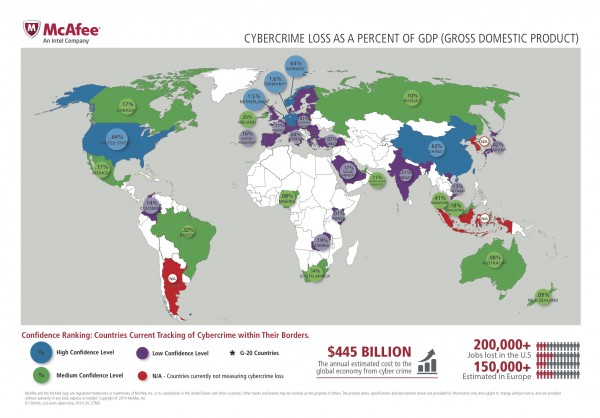
Graphic by George Thomas. Licensed under CC BY 2.0
Cyber crimes are costing Singapore an estimated S$1.25 billion, as crooks get smarter in activities ranging from market manipulation to cyber espionage, according to security report yesterday.
Published by the Center for Strategic and International Studies (CSIS) and sponsored by cybersecurity firm McAfee, it estimated Singapore’s losses to be part of a massive S$445 billion loss incurred by businesses and governments worldwide.

![]()
Gathering data from government agencies and cyber security firms, the report found that G20 nations bore the brunt of cyber attacks, with the world’s four largest economies – the United States, China, Japan, Germany – collectively losing S$250 billion.
This could be attributed to cyber criminals increasingly targeting knowledge-based industries, which contribute significantly to G20 economies.
Such activities include the theft of confidential business information. Cyber criminals hacked company networks, central banks and finance ministries to acquire insider information for the purposes of financial manipulation, a highly lucrative and exceptionally difficult crime to detect, according to the report.
The man on the street wasn’t spared either. A security report released by Microsoft last month confirmed that cyber criminals increasingly use deception to obtain personal data, such as credit card information and bank accounts.
According to yesterday’s report, there are an estimated 40 million victims of personal data theft in the US alone. The global loss of such breaches could amount to as much as S$200 billion, it added.
The damage inflicted by cyber criminals extends beyond the financial aspect as well. The study noted that intellectual property (IP) theft slowed the pace of global innovation and led to increased unemployment in IP-intensive, high-value industries.
All this spells serious implications for Singapore, as its knowledge-based economy pushes towards greater innovation and inter-connectedness.
“It is very worrying how much cyber crime costs economies around the world, including Asean,” said Wahab Yusoff, vice-president of McAfee Southeast Asia, in a statement.
“This is a shocking reminder to take every precaution to try and safeguard our organisations across the private and public sector against hackers and malware,” he added.
With global cyber crime set to grow over the coming years, governments are beginning to take serious efforts to collect and publish data on cyber crime as part of an international collaboration to thwart cyber criminals.
“It’s clear that there’s a real tangible economic impact associated with stopping cyber crime,” said Scott Montgomery, chief technology officer of public sector at McAfee.
“When we do so, we create opportunities for positive economic growth and job creation worldwide,” he noted.





